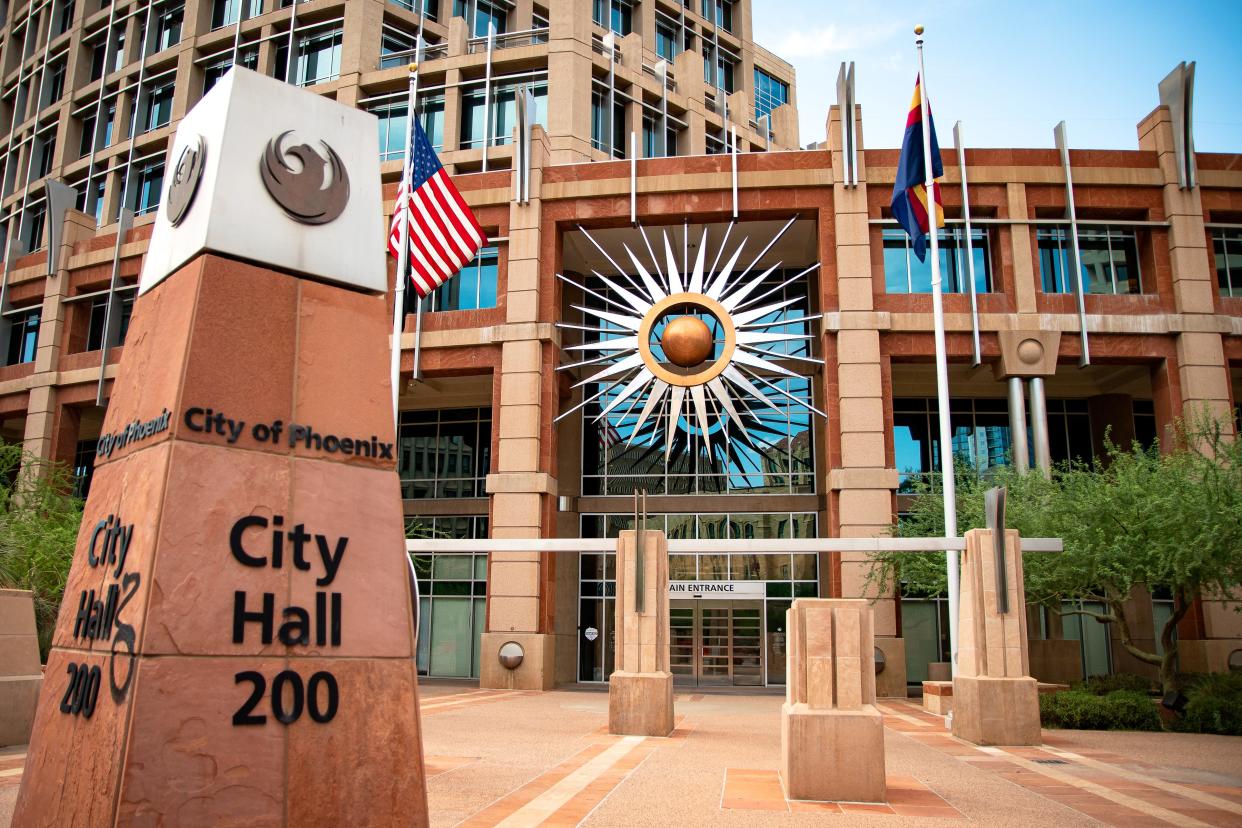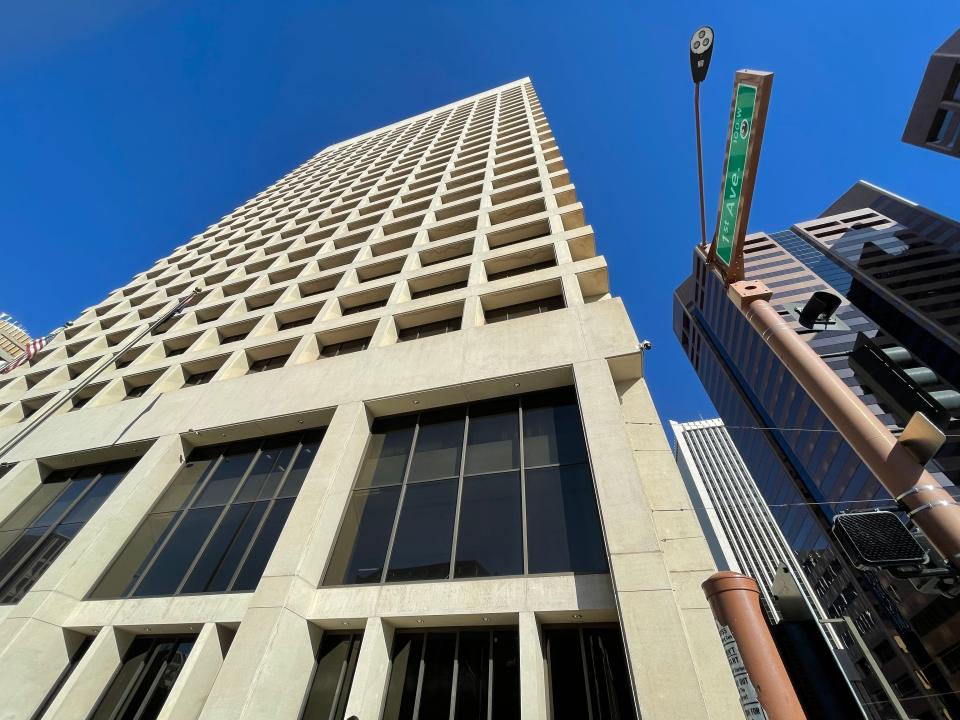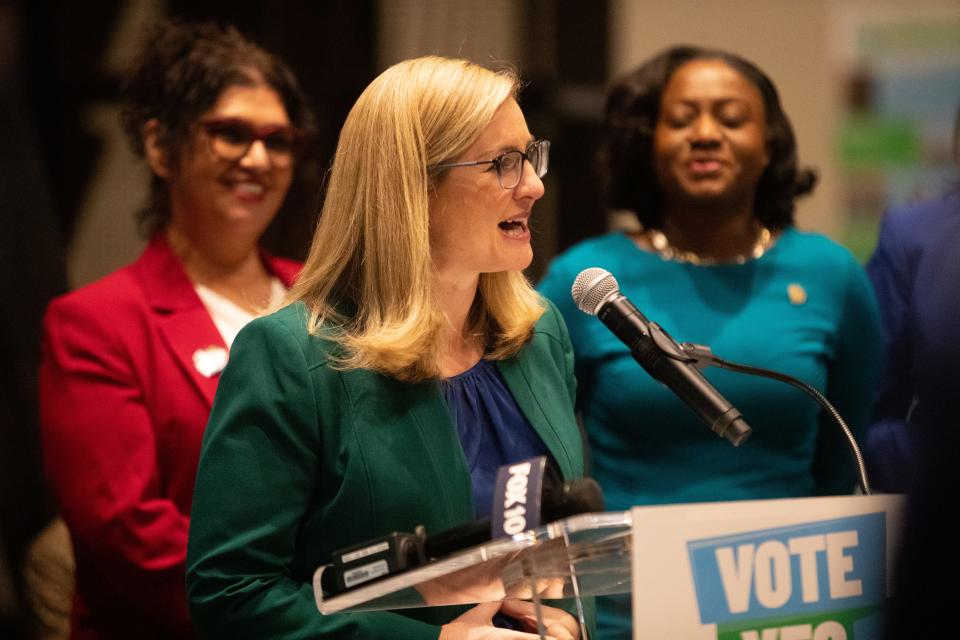Phoenix City Council signals potential challenge to DOJ police investigation

A majority of Phoenix City Councilmembers said they wouldn't sign a preliminary legal agreement that the U.S. Department of Justice could propose before it wraps up its civil rights investigation of the Phoenix Police Department.
The Justice Department could release findings any day on a wide-ranging two-year probe that has involved more than 100 interviews and 80,000 documents. In past probes elsewhere, the feds have released findings after about 18 months.
Once it releases its report, the Justice Department typically asks cities to sign on to an agreement, known as a consent decree, that brings in federal monitors to oversee reforms at the police department.
For now, councilmembers are unenthusiastic about that prospect. Phoenix appears ready to reject a legal offer to cooperate and avoid litigation.
If the council were to reject a consent decree, it would make Phoenix the largest city in the nation to resist Justice Department involvement in police reforms. It could set up a heavy-hitting, potentially costly and lengthy legal battle as it has in seven other locales, two of them in Arizona.
But city officials say it may be worth it to protect local decision-making.
Influenced by the city's police union, political advocacy groups, a fierce email campaign from Phoenix residents, and their own personal discretion, four City Council members say changes the Justice Department might request from the city could jeopardize the city's finances without any assurance the police department would be better off.
They refuse, they say, to sign anything without proper evidence.
The Justice Department opened its inquiry in August 2021, promising to look into claims of excessive use of force by Phoenix officers, retaliation against protesters, discriminatory policing practices and the department's response to people with disabilities or who were experiencing homelessness.

The inquiry came after criticism from the community about the department's use of force and investigations by The Arizona Republic and other media into Phoenix's high rate of police shootings and disproportionate use of violence against people of color.
The Justice Department did not respond to request for comment for this article.
More: Justice Department will investigate Phoenix police practices, use of force
What happens after a Department of Justice investigation?
Unless nothing improper is found, investigations conclude with a "findings letter" that outlines evidence of "specific problems" within the police department or between the department and the city, according to the Justice Department's Civil Rights Division. It also includes a plan to solve root problems.
But before a findings letter, the Justice Department sometimes asks cities to sign another agreement, one that says they intend to "avoid litigation" and "come to an agreement to address the Division’s findings." The document is called a "statement of intent" or "agreement in principle."
The Justice Department would need to get at least five of the nine councilmembers to sign such a preliminary agreement.
Mayor Kate Gallego and Councilmembers Ann O'Brien, Jim Waring, Debra Stark and Kevin Robinson said they won't sign the preemptive document. They said they need to see evidence first.

Vice Mayor Yassamin Ansari and councilmembers Laura Pastor, Betty Guardado and Kesha Hodge Washington have not indicated where they stand on intent statements or consent decrees.
Pastor, Guardado and Hodge Washington did not respond to requests for comment from The Arizona Republic. Ansari's office said it was still gathering information before deciding.
The council members leaning against an agreement with Justice Department all offer similar reasons: Consent decrees don't make cities safer, and they add bureaucracy and slow progress. They lower morale in the department, which could lead to an exodus of quality officers and hamper recruitment efforts, which already have been a long-running struggle.
Essentially, the council members said, agreeing to a consent decree would be handing over the keys to the city to the Justice Department, and to do that without evidence would be akin to buying a home without an inspection first.
"I believe in everyone's civil rights, but you can't just hoist something on us without us understanding the report," Stark said.
"They’re hoping Phoenix will roll over and sign on to a consent decree — effectively relinquishing control of our department to them," wrote O'Brien in an op-ed for The Arizona Republic.
Robinson, a 36-year veteran of the Phoenix Police Department and current criminal justice professor at Arizona State University, said he has studied departments under a consent decree, and he doesn't like what he sees.
"In a lot of those cities, you don't see a lot of, in my opinion, truly positive change because of the consent decree," Robinson said. "You see change that was happening already. And then a consent decree comes in, and things may still happen, but they happen at a really slow rate because now there's so much bureaucracy involved."
Waring said he believed a consent decree would lead to more retirements.
"It'll be harder to recruit to fill the vacancies, and I think it will actually hurt public safety," he said.
Though a council majority is not interested in signing a preliminary agreement before the Justice Department releases its conclusions from the investigation, most members said they wanted to consider those findings before deciding whether to enter a consent decree.
Other options for a resolution were less clear because the Justice Department did not respond to questions about what could happen.
Police consultant weighs in: 'They don't care about your true crime problems'
Identical points, often with verbatim wording, were made by Seattle-based police consultant Bob Scales, who has traveled to Phoenix in recent months to warn of the danger of consent decrees.
Scales formerly negotiated reforms between the Seattle Police Department and the Justice Department, then worked as the department's compliance coordinator for nearly two years starting in 2013. Now, he does data analytics for police departments through his firm, Police Strategies.
He flew to Phoenix in October to meet with City Council members and warn neighborhood groups after Operation Blue Ribbon, a local pro-police advocacy group sought him out and paid for his travel.
"They will dictate everything in the department, and they don't care what the community thinks. They don't care about your true crime problems," Scales told a north Phoenix block watch group in November over Zoom.
The 25 residents widened their eyes in disbelief, scoffing at times.
In an hourlong presentation, Scales clicked through a slideshow, explaining how the Justice Department generally bulldozes into city halls, intimidates mayors into signing agreements with vague or no evidence, then devastates local budgets, leaving taxpayers to foot the bill.
More: Racial profiling lawsuit, reforms for Maricopa County Sheriff's Office top $250M in costs
Scales said recruitment struggles, hiring unqualified officers and slashes to the budget are all on the table if Phoenix doesn't push back.
"If the city signs the consent decree, it's all over because you're handing over the control of your department and the city budget to a federal monitor and a federal judge. And they will determine policing and public safety in the city of Phoenix for the next decade or more, Scales said.
He pointed to how federal oversight of the Maricopa County Sheriff's Office as part of the Melendres v. Arpaio court case contributed to Sheriff Paul Penzone's decision to step down — which councilmembers highlighted, too.
Penzone, in a news conference announcing his resignation, said, "When I have more people investigating internal affairs and compliance issues than I do crimes in our community, something's wrong."
The Melendres case, in its 16th year, has cost the county more than $250 million.
Phoenix residents also shared concerns about government overreach and losing their freedoms. They discussed launching more email campaigns to City Council and starting a petition. One resident said she would contact her congressional representatives to see about changing federal law to revoke or reduce the Justice Department's power.
Pressure campaigns against Department of Justice control
Beyond the restaurant walls, outside efforts to sway City Council also were underway.
Billboards along Interstate 10 just east of downtown advertised "SavePhx.com," a website chock-full of editorials against consent decrees.
Operation Blue Ribbon, founded by Phoenix resident and former North Central Phoenix Homeowners Association president Anne Ender, paid for the billboards. But Ender said she wasn't operating the site and declined to say who was. She started the Blue Ribbon group in 2020 in response to the backlash after George Floyd was killed in Minneapolis.
The Republic sent a message to the email associated with the site, and the response was the operators were "not officers in the department and it is not the union."
The email said the residents behind the site were shielding their identity for fear of federal government retaliation.
Operation Blue Ribbon also previously launched email campaigns and hosted additional community meetings with Bob Scales.
America Pack, a right-wing political action group, sent emails and hosted events, too. It put out calls to action on its Facebook page with slogans like, "Stop the DOJ - Don't handcuff our cops. City Council MUST defend the Phoenix police..."
Local groups critical of Phoenix police also have signaled skepticism of the Justice Department and consent decrees.
A spokesperson for Poder, an advocacy group that has scrutinized Phoenix police, said the investigations typically result in high costs to taxpayers and ineffective reforms that fail "to end the killing of Black, Brown, Indigenous, poor, disabled, unsheltered and LGBTQ+ people."
Shalae Flores of Poder said the organization took one meeting with the Justice Department in fall 2021 but "decided not to continue our engagement ... after that."
What could happen next?
Scales said he's never seen anything like it.
"If the City of Phoenix stands their ground against the DOJ juggernaut, the entire consent decree system will come crashing down," he wrote on LinkedIn. "DOJ's pattern-or-practice findings are simply a bluff."
In a 2017 report, the Justice Department's Civil Rights Division said seven jurisdictions had tried — unsuccessfully in the end — to resist agreements for reform.
Maricopa County and Colorado City in Arizona, along with Alamance County, North Carolina; Meridian, Mississippi; Columbus, Ohio; and New Orleans resisted until the Justice Department ultimately won concessions after filing court actions. Ferguson, Missouri, entered a consent decree in response to the government's lawsuit.
It was unclear what would happen if Phoenix City Council refused to sign an initial intent statement. But if the council resisted a consent decree, the Justice Department said in its 2017 report it "is fully prepared to litigate" when municipalities are uncooperative.
Scales says litigation would be worth it. It would be costly, but no costlier than the changes required from a potential consent decree, he said.
"Why would the city agree that they have a pattern or practice of unconstitutional policing inside a consent decree without making DOJ prove its case?" Scales said. "It would essentially be like being charged with a crime and pleading guilty without ever seeing the evidence."
Reporter Taylor Seely covers Phoenix for The Arizona Republic / azcentral.com. Reach her at tseely@arizonarepublic.com or by phone at 480-476-6116.
Reporter Miguel Torres covers public safety for The Arizona Republic / azcentral.com and contributed to this report.
This article originally appeared on Arizona Republic: Phoenix City Council may challenge DOJ police investigation

